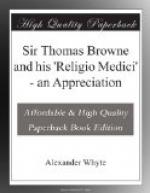’I had rather believe all the fables in the Legend, and the Talmud, and the Alcoran, than that this universal frame is without a mind: and therefore, God never wrought miracles to convince atheism, because His ordinary works convince it. It is true, that a little philosophy inclineth man’s mind to atheism, but depth in philosophy bringeth men’s minds about to religion.’ The old proverb, Ubi tres medici, duo athei, cast an opprobrium on the medical profession that can never have been just. At the same time, that proverb may be taken as proving how little true philosophy there must have been at one time among the medical men of Europe. Whereas, in Sir Thomas Browne at any rate, his philosophy was of such a depth that to him, as he repeatedly tells us, atheism, or anything like atheism, had always been absolutely impossible. ’Mine is that mystical philosophy, from whence no true scholar becomes an atheist, but from the visible effects of nature, grows up a real divine, and beholds, not in a dream, as Ezekiel, but in an ocular and visible object, the types of his resurrection.’ Nor can he dedicate his Urn-Burial to his worthy and honoured friend without counselling him to ’run up his thoughts upon the Ancient of Days, the antiquary’s truest object’; so continually does Browne’s imagination in all his books pierce into and terminate upon Divine Persons and upon unseen and eternal things. In his rare imagination, Sir Thomas Browne had the original root of a truly refining, ennobling, and sanctifying faith planted in his heart by the hand of Nature herself. No man, indeed, in the nature of things, can be a believing Christian man without imagination. A believing and a heavenly-minded man may have a fine imagination without knowing that he has it. He may have it without knowing or admitting the name of it. He may have it, and may be constantly employing it, without being taught, and without discovering, how most nobly and most fruitfully to employ it. Not Shakespeare; not Milton; not Scott: scarcely Tennyson or Browning themselves, knew how best to employ their imagination. Only Dante and Behmen of all the foremost sons of men. Only they two turned all their splendid and unapproached imagination to the true, and full, and final Objects of Christian faith. Only to them two was their magnificent imagination the substance of things hoped for, and the evidence of things not seen. And though the Religio does not at all rank with the Commedia and the Aurora, at the same time, it springs up from, and it is strengthened and sweetened by the same intellectual and spiritual root. Up through all ‘the weeds and tares of his brain,’ as Sir Thomas himself calls them, his imagination and his faith shot, and sprang, and spread, till they covered with their finest fruits his whole mind, and heart, and life.




